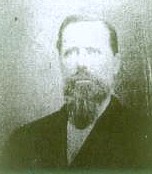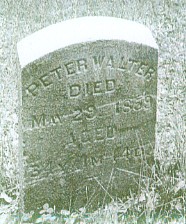|
THE CALEDONIA METHODIST CHURCH

In the year of 1855, a large group of pioneers, the WALTER
family along with their kinfolk comprising of the STUCK and
SWIGART families, arrived in Iowa. They had traveled by ox wagons from Swan Creek, Ohio. Following the Dragoon Trace, the
pioneers arrived Lotts Creek located along the east fork of the Grand River. The pioneers included descendants of John WALTER,
a widower - Fanny (WALTER) and Isaac SWIGART, Catherine (WALTER) and Ed STUCK, John Jr. and Susan (SWIGART) WALTER, and
Peter WALTER who was unmarried. Also in the group were John's brother Abraham WALTER and his wife Martha (FREED) and their
children, John's brother George WALTER and his wife Catherine (SWIGART), John's sister Sarah and her husband David BALES, and
John's brother Martin WALTER. Martin WALTER left the group in eastern Iowa where he settled. Sarah (WALTER) and David
BALES journeyed on to Gentry County, Missouri. When the WALTER and affiliated kin arrived in Lotts Creek, Ringgold City was
the only settlement in that portion of Ringgold County. Ringgold City consisted of a store and a trading post. Seeing a need,
Peter WALTER decided to found a town in the center of where the family had settled.
The town was founded around the year 1855 with the post office opening in 1856. Peter would serve as the town's first
postmaster.
 Around this time, Reverend Peter ANDREWS, a widower from Nova Scotia, settled in Lotts Creek with
his brother-in-law William CAMPBELL and Peter MOFFITT. Rev. ANDREWS was a Baptist minister and had obtained a better education
than the other settlers in the area. He was given the distinction of naming the newly founded town. His choice was "Caledonia"
which was taken from Sir Walter SCOTT's "Lady of the Lake."
Around this time, Reverend Peter ANDREWS, a widower from Nova Scotia, settled in Lotts Creek with
his brother-in-law William CAMPBELL and Peter MOFFITT. Rev. ANDREWS was a Baptist minister and had obtained a better education
than the other settlers in the area. He was given the distinction of naming the newly founded town. His choice was "Caledonia"
which was taken from Sir Walter SCOTT's "Lady of the Lake."
Another version is that the name "Caledonia" is a Latin name given by the Roman Empire to a northern
area of Great Britain.
Two more of John WALTER's daughters, Elizabeth and Anna,
arrived in a one-horse carriage from Swan Creek, Ohio. Elizabeth would later marry the widower Rev. Peter ANDREWS.
 Unfortunately, Peter WALTER died in 1859 of tuberculosis and was interred at the new
cemetery located west of Caledonia. He did not live long enough to see his town grow rapidly and thrive.
Unfortunately, Peter WALTER died in 1859 of tuberculosis and was interred at the new
cemetery located west of Caledonia. He did not live long enough to see his town grow rapidly and thrive.
The early settlers of Caledonia were from various religious faiths. The WALTER family was Amish Mennonite, United Brethren
and Methodist Episcopal faiths. The CAMPBELLS, the ANDREWS, and the MOFFITTS were Baptists. Others were of the Methodist
Episcopal faith. The first mention of the Caledonia Methodist Episcopal Church was in the 1864 annual Conference when the
Caledonia Class contributed $3.65 for Missions.
In 1872, several of the men of Caledonia united in an effort to built a church. They drove their hogs to market in Ottumwa and
returned with loads of lumber for the church building. Those who helped build the church included William CAMPBELL,
Enoch and Joseph McANINCH, Abraham "Abe" and John WALTER, Jonathan and Ed STUCK, the JOHNSON family, and John DWYER.
The archives of the Methodist Church in Mount Pleasant states that the Caledonia Church had 142 members and 2 local preachers
in 1872. There had been 16 baptisms. The church building and parsonage was valued at $450. The congregation had contributed
$11.30 to Missons. Caledonia was the principal church in a circuit which also included the High Point Church. It became
a minor church in 1880 and wasn't directly mentioned afterward in the Conference records for several years.
Rev. J. S. MORROW was appointed as Caledonia Methodist Church's pastor in 1872. Other early-day pastors included
the Reverends C. A. B. WATSON, M. ALLEN, C. HOOVER, W. W. DANNER, W. W. BREWER, Charles W. BREWER, R. W. MATHENY (1890's),
William B. THOMPSON (1890's),
and C. H. BURLEIGH. From 1900 until the
pastorate of Rev. T. S. RHOADES, the Caledonia Church was on a circuit with Highland, Benton, Fry Chapel, and Mt. Zion.
Caledonia's ministers during this time included the Reverends T. C. TEAS, W. M. LEISER, J. A. VANATTA, S. W. MITCHELL,
M. D. WICHARD, A. C. HUCKATHORN, and Frank ULLERY.
 Reverend T. S. RHOADES served Benton and Caledonia (and at time Fry Chapel) for a period of forty years. In 1950, during
the pastorate of Reverend George PENNINGTON, the Caledonia Church was attached to the Mount Ayr Circuit where it remained
until services were discontinued on January 1, 1972. Other ministers who served Caledonia's church during this time were
the Reverends Clarence W. WOOLLARD, John A. LIPPINCOTT, W. P. GAUER, William H. MOREHOUSE, and Jerrold W. SWINTON.
Reverend T. S. RHOADES served Benton and Caledonia (and at time Fry Chapel) for a period of forty years. In 1950, during
the pastorate of Reverend George PENNINGTON, the Caledonia Church was attached to the Mount Ayr Circuit where it remained
until services were discontinued on January 1, 1972. Other ministers who served Caledonia's church during this time were
the Reverends Clarence W. WOOLLARD, John A. LIPPINCOTT, W. P. GAUER, William H. MOREHOUSE, and Jerrold W. SWINTON.
One of the mysteries of the Caledonia Church is that the deed to the land on which the church was built was dated two
years after the church had been built.
 Jim WALLING purchased the Caledonia Methodist
church in the early 1980's. The church burned before restoration work had been completed.
Jim WALLING purchased the Caledonia Methodist
church in the early 1980's. The church burned before restoration work had been completed.
Caledonia was thriving in 1880 with a peak population of nearly 270. Her residents hoped that the arrival of a railroad from Hopeville [Clarke County, Iowa] along the
Dragoon Trace to Saint Joseph, Missouri, would assure the town's future. Instead, the railroad was built from the east to
Mount Ayr and on to Grant City, Missouri. With the railroad bypassing the town, Caledonia failed to grow and expand. It
was still an important trading center in the early 1900's. By the 1970's it was a ghost town. Today in 2010, there is
only one resident in Caledonia and a total population of 130 for Lotts Creek Township.
Site of Caledonia Methodist Church, 1872-1972
SOURCES:
FOSTER, Holland. The Ghost Town of Caledonia 1978.
Centennial Committee. The Centennial History of the Caledonia U.M.E. Church & The Village of Caledonia in
Lotts Creek Twp., Ringgold Co. IA 1976.
NEIBERGALL, Larry E. "Caledonia" A Very Quiet Place" Des Moines Sunday Register Des Moines, Iowa. September 19, 1982.
Compilation by Sharon R. Becker, April of 2010

History of Caledonia
History of Caledonia, by John G. Stephens
Caledonia Folks
Caledonia Cemetery
Transcription of Caledonia Cemetery
Caledonia Cemetery Photographs


| 

